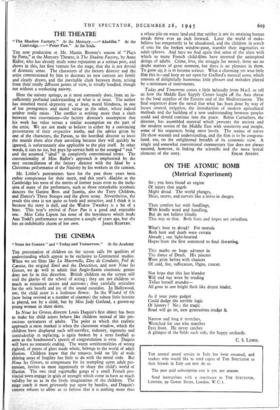THE CINEMA
"Nous les Gosses " and " Today and Tomorrow." At the Academy
THE presentation of children on the screen calls for qualities of understanding which appear to be exclusive to Continental studios. When we see films like La Maternelle, Zero de Conduite, Poll de Carotte, the original Emil and the Detectives, and now Nous les Gosses, we do well to admit that Anglo-Saxon cinematic genius does not lie in this direction. British children on the screen still trail the glories of the school of acting ; they are not children so much as miniature actors and actresses ; they carefully articulate for the sole benefit and joy of the sound recordist. In Hollywood, too, the child actor is a hothouse flower. In the Wizard of Oz (now being revived at a number of cinemas) the robust little heroine is played, not by a child, but by Miss Judy Garland, a grown-up young woman in short skirts.
In Nous les Gosses, director Louis Daquin's first object has been to make his child actors behave like children instead of like pre- cocious caricatures of adults. The point at which this realistic approach is most marked is when the classroom window, which the children have displayed such self-sacrifice, industry, ingenuity and comradeship in replacing, is again broken by a stray football as soon as the headmaster's speech of congratulation is over. Daquin will have no romantic ending. The warm sentimentalities of wrong righted, of panes of glass made whole, belongs to the world of adult illusion. Children knpw that the tenuous hold on life of wide shining areas of fragility has little to do with the moral code. But Nous les Gosses, to compensate for its trampling upon adult pre- tension, invites us most ingeniously to share the child's world of illusion. The two rival ragamuffin gangs of a small French pro- vincial town engage in Oats of strength which come to have as much validity for us as in the lively imaginations of the children. The stage coach is most grievously put upon by bandits, and Daquin's camera refuses to allow us to believe that it is nothing more than a refuse pile on waste land and that neither it nor its straining human steeds move ever an inch forward. Later the world of make- believe has temporarily to be abandoned, and the children. in search of sous for the broken window-pane, transfer their ingenuities to adult spheres. And here we find again that sense of the alien with which so many French child-films have invested the uninspired doings of adults. Crime, love, the struggle for money, these are no doubt matters of great moment, but there is no pleasure in them. To grow up, it is to become serious. What a charming yet wise little film this is—and keep an ear open for Gaillard's musical score, which consists of delightfully humorous little phrases and melodies played by a minimum of instruments.
Today and Tomorrow comes a little belatedly from M.o.I. to tell us how the Middle East Supply Centre fought off the Axis threat to the food supplies of the Eastern end of the Mediterranean. The final sequences draw the moral that what has been done by way of locust control, irrigation, the introduction of modern agricultural methods and the building of a new understanding between peoples could and should continue into the peace. Robin Carruthers, the director, has assembled material which presents the ancient and the modern stories of the Middle East with sensitivity and insight, some of his sequences being most lovely. The scenes of native life show warmth and understanding, and the film is to be congratu- lated, too, on the enlightened breadth of its economic view. A single and somewhat conventional commentary line does not always succeed, however, in linking the scientific and the more lyrical






























 Previous page
Previous page